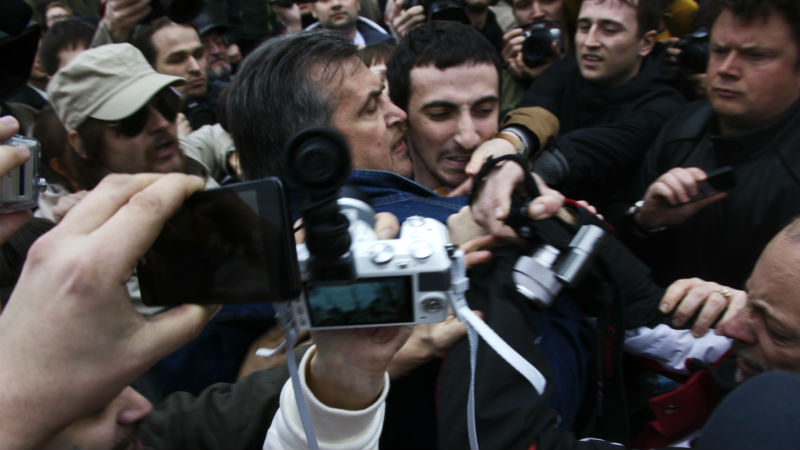
Protesters at an opposition rally in Bolotnaya square, Moscow, document the event. Photo from Demotix.
With independent online media closing down or moving abroad and state-controlled TV following the Kremlin's every move, Russian bloggers now find themselves stranded in a media landscape dominated by the government. While blog platforms and their users still have arguably the greatest freedom for political debates and critiques of the government, and blogs have played a unique and pivotal role in those debates, the freedom has shrunk dramatically in the last year alone. Thus, the political agenda of the Russian blogosphere has also turned inward, with bloggers contemplating their own safety, and access to the Internet itself now at stake.
A study published in April found that Russian blogs were the most independent space for political discussion in 2010-2011, as mainstream Internet, print newspapers, and TV news closely mirrored the Kremlin’s dictated news agenda. The study, conducted by the Berkman Center for Internet and Society, used word associations to study similar rhetoric and story selection in government websites, state-controlled TV channels, top Russian news sites and political blogs.
Researchers were surprised to find that Russian news sites closely mirrored official government news. While major Russian TV channels are widely known to be obsequious to the Kremlin, in December 2010–December 2011, when the data was collected, mainstream news sites in Russia still enjoyed a relative freedom from editorial control that has led many to believe that they were relatively uncensored. However, researchers found extensive similarities in tone and story selection between Russian mainstream news sites and official government announcements.
The study affirmed however, that Russian blogs continued to function as platforms for independent viewpoints. The topics and tone of these blogs differed greatly from mainstream news sites, state-controlled TV and government news. Russian political blogs addressed issues rarely discussed on state-controlled TV, like corruption, the arrest of oil tycoon Mikhail Khodorkovsky, and civil rights. In this relative isolation from mainstream news sources, the Russian blogosphere in 2010-2011 was what researchers called an “alternative public sphere,” fostering an exchange of opinions and information independent of other Russian media.
The story has changed in the last few years however, as many independent online media outlets, like Lenta.ru, have been appropriated by the Kremlin, losing their freedom in exchange for closer government content control, while others faced blocking and blacklisting.
The shrinking space for an independent media agenda in the RuNet has meant less structured discussion platforms, like blogs and social media communities, now play an even greater role in political debate and dissent, permitting Russians to decide which issues concern them and organize themselves for action. Researchers cited the voter-fraud protests of 2012 as a prime example, when blogs enabled rapid organization and distribution of video evidence.
The Kremlin's most recent actions portend a darker future for independent Internet forums and blogs in Russia. Russian lawmakers have unleashed a litany of hostile legislation in an attempt to crack down on politically active bloggers and social media users, using anti-extremist and anti-terrorist laws to silence online dissent. The Kremlin is also expanding its control of the RuNet infrastructure and user data, as it contemplates an autonomous Internet, free from Western influence.
As Russia-based social networks fall under government influence and hand the Kremlin more control over the information agenda of a previously liberal space, media experts fear that alternative platforms (such as Facebook or Twitter) hosting Russian users and their politics may soon find themselves shut out from the RuNet.
Unfortunately, as the Russian government becomes increasingly more paranoid about the dangers of free expression online, most ordinary Russians remain uninterested in the bloggers’ plight or in protecting them, even as they fight on as the last independent voices left standing in Russia. Whether this attitude might change once whole social media platforms become unavailable to the RuNet users remains to be seen. Until then, Russian bloggers and social media users will have to adjust to the new harsh reality of a public sphere which requires you to register with the state as soon as your ‘alternative’ opinions gain any traction.



